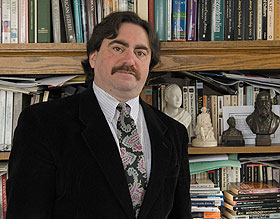  |
| HOME | THIS ISSUE | CALENDAR | GRANTS | BACK ISSUES | < BACK | NEXT > |
English professor's book compares lives and times of Grant and Lee by Sherry Fisher - February 25, 2008 | ||||
| A new book by UConn professor Robert Tilton examines the lives of Civil War foes Robert E. Lee and Ulysses S. Grant. Lee and Grant, a comparative biography of the two figures, was written with William Rasmussen, curator of art at the Virginia Historical Society. The book, published by Giles Ltd., London, accompanies a traveling exhibit the two curated for the society. “We look at the lives of both figures, before and after the Civil War,” says Tilton, chair of the English department. “We try to answer questions about them, such as why did Lee make the decision to give up his commission in the United States Army? Why did he choose to fight on after the cause was lost? Was Grant an alcoholic? And was his presidential administration the most corrupt in American history? “We also wanted readers to learn about the America of the mid-19th century in which Lee and Grant lived, and to get a sense of the moments in their lives that we rarely see,” Tilton says. Tilton and Rasmussen have collaborated on three other exhibitions. Tilton, a New Yorker, says it was interesting writing a book about Lee and Grant with his co-author, who is from Virginia. “We both learned a lot,” he says. The book has more than 270 illustrations, including ones of the generals’ uniforms, letters, paintings, photographs, prints, and decorative objects. “We had to begin by reading some of the many, many biographies written about Lee and Grant,” Tilton says. “A good deal of the information about Grant came from his book Memoirs, which is one of the finest books of its kind written in America.” Tilton points to parallels and contrasts in their lives. “Both Lee and Grant went to West Point. Lee went through his entire academy career with no demerits; he was a model cadet. Grant had many demerits. “Both fought in the Mexican War. Lee was one of that war’s great heroes, while Grant, 15 years younger, was still a junior officer.”
He adds, “Both left the military in the 1850s. Grant, posted on the west coast, was lonesome for his wife Julia and his children, so he decided to give up his commission and return home. He took up farming in Missouri, at which he was a dismal failure. “Lee, who had married Mary Randolph Custis, the great-granddaughter of Martha Washington, inherited Arlington House, which is where Arlington National Cemetery is now,” Tilton says. Lee’s life was dominated by George Washington. “He wanted to be just like him. Lee’s father, ‘Light-horse Harry’ Lee, was one of Washington’s commanders, and Lee grew up hearing stories about the ‘Father of His Country.’” After the war, both Grant and Lee were interested in reconciliation, Tilton says: “When there was a move to arrest the Confederate officers who had surrendered to him, Grant put a stop to it. He told President Andrew Johnson that he had paroled Lee, as he had a right to do when deciding on surrender terms. Johnson caved in and no arrests were made.” Tilton says that one of Grant’s faults during his presidency was his loyalty to those he had appointed. “We often view him now as a president who didn’t know what was going on in his administration,” he says, “but when he became aware of any scandalous behavior, he did his best to correct the situation. He also attempted to protect the rights of the freedmen, and to deal fairly with Native Americans.” Tilton says the book is for general readers as well as scholars. “It needed to be accessible to the reader who is not a specialist in 19th-century American history, but who wants to learn something about Lee and Grant.” |
| ADVANCE HOME UCONN HOME |

